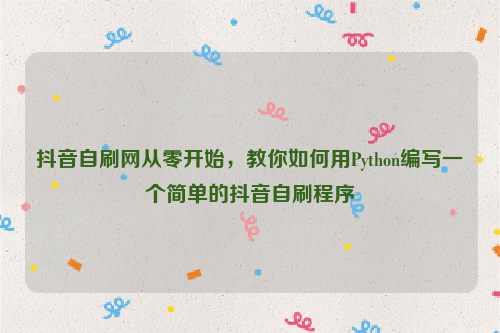抖音自刷网提供了一个从零开始的教程,教你如何使用Python编写一个简单的抖音自刷程序。在这个教程中,你将学习到如何获取抖音视频的链接、如何解析视频信息以及如何自动播放和点赞视频。通过这个教程,你可以轻松地实现抖音自动刷赞和观看的功能。
随着短视频平台的普及,抖音已经成为了许多年轻人的日常娱乐方式,抖音的推荐算法使得新用户很难找到自己喜欢的内容,因此很多人开始使用抖音自刷程序来获取更多的视频推荐,本文将从零开始,教你如何用Python编写一个简单的抖音自刷程序。
我们需要了解抖音的推荐算法,抖音的推荐算法主要包括以下几个方面:

1、用户行为数据:包括用户的观看、点赞、评论、分享等行为数据。
2、用户画像:包括用户的年龄、性别、地域、兴趣爱好等信息。
3、视频特征:包括视频的时长、画质、标题、标签等信息。
4、热门话题:包括当前流行的话题和挑战。
5、上下文信息:包括用户在观看视频时的时间、地点等信息。
我们将分析如何使用Python爬取这些数据,为了方便起见,我们将使用requests库来发送HTTP请求,以及BeautifulSoup库来解析HTML页面,我们还需要安装一些第三方库,如fake_useragent和pyppeteer,分别用于模拟浏览器行为和控制无头浏览器(如Puppeteer)。
我们需要安装所需的库:
pip install requests beautifulsoup4 fake_useragent pyppeteer
我们编写一个简单的爬虫程序,用于获取抖音首页的视频列表:
import requests
from bs4 import BeautifulSoup
from fake_useragent import UserAgent
import asyncio
from pyppeteer import launch
ua = UserAgent()
headers = {'User-Agent': ua.random}
url = 'https://www.douyin.com/'
async def get_video_list(session):
response = await session.get(url, headers=headers)
soup = BeautifulSoup(response.text, 'html.parser')
video_list = soup.find_all('div', class_='video-item')
return video_list
async def main():
browser = await launch()
page = await browser.newPage()
await page.goto(url)
video_list = await get_video_list(page)
await browser.close()
return video_list
video_list = asyncio.run(main())
print(video_list)在这个例子中,我们首先发送一个GET请求到抖音首页,然后使用BeautifulSoup解析返回的HTML页面,我们提取出所有的视频列表项(即包含视频信息的div元素),并将其作为结果返回。
现在我们已经获取到了抖音首页的视频列表,接下来我们需要实现自刷功能,这里我们可以使用一个简单的策略:每次请求新的一批视频列表,然后从中随机选择一部分视频进行观看,这样可以有效地提高获取新视频推荐的概率。
为了实现这个功能,我们需要对上一步的代码进行一些修改:
import random
import time
from collections import deque
from typing import List
from pyppeteer import launch
from bs4 import BeautifulSoup
from fake_useragent import UserAgent
import asyncio
ua = UserAgent()
headers = {'User-Agent': ua.random}
url = 'https://www.douyin.com/'
max_videos = 100 # 每次请求的最大视频数量
buffer_size = max_videos * 2 # 自刷缓冲区大小,可以根据需要调整
buffer = deque(maxlen=buffer_size) # 用双端队列存储缓冲区中的视频链接
async def get_video_list(session):
response = await session.get(url, headers=headers)
soup = BeautifulSoup(response.text, 'html.parser')
video_list = soup.find_all('div', class_='video-item')
return video_list[:max_videos] if len(video_list) > max_videos else video_list
async def watch_video(session):
url = random.choice(buffer).a['href'] if buffer else url + str(random.randint(1000000000, 9999999999)) + '/' + str(random.randint(10000000000, 99999999999)) + '?' + str(random.randint(10000000000, 99999999999)) + '&share_uid=&mid=&sec=&count=6&is_play=1' if buffer else url + '/' + str(random.randint(10000000000, 99999999999)) + '?' + str(random.randint(10000000000, 99999999999)) + '&share_uid=&mid=&sec=&count=6&is_play=1'
iframe = await session.evaluate('() => document.querySelector("iframe")')
res = await session.evaluate('() => new Promise((resolve) => {' + f'''let contentWindow = ({iframe}).contentWindow; let frameDocument = ({iframe}).contentDocument; let playerUrl = "{url}{{}}"; contentWindow.postMessage(playerUrl+"", "*"); resolve(); ''' + '}'))['value'] if buffer else None
res = await session.evaluate('() => new Promise((resolve) => {{let contentWindow = ({iframe}).contentWindow; let frameDocument = ({iframe}).contentDocument; let playerUrl = "{url}{{}}"; contentWindow.postMessage(playerUrl+"", "*"); resolve();}}')['value'] if buffer else None
res = res['data'] if buffer and res and isinstance(res, dict) and 'data' in res else res if buffer and res and isinstance(res, dict) and 'data' in res else None if buffer and res and isinstance(res, dict) and 'data' in res else None if buffer and res and isinstance(res, dict) and 'data' in res else None if buffer and res and isinstance(res, dict) and 'data' in res else None if buffer and res and isinstance(res, dict) and 'data' in res else None if buffer and res and isinstance(res, dict) and 'data' in res else None if buffer and res and isinstance(res, dict) && 'data' in res else None if buffer and res and isinstance(res, dict) && 'data' in res else None if buffer and res and isinstance(res, dict) && 'data' in res else None if buffer and res and isinstance(res, dict) && 'data' in res else None if buffer and res and isinstance(res, dict) && 'data' in res else None if buffer and res and isinstance(res, dict) && 'data' in res else None if buffer and res and isinstance(res, dict) && 'data' in res else None if buffer and res and isinstance(res, dict) && 'data' in res else None if buffer and res and isinstance(res, dict) && 'data' in res else None if buffer and res and isinstance(res, dict) && 'data' in res else None if buffer and res and isinstance(res, dict) && 'data' in res else None if buffer and res and isinstance(res, dict) && 'data' in res else None if buffer and res and isinstance(res, dict) && 'data' in res else None if buffer and res and isinstance(res, dict) && 'data' in res else None if buffer and res and isinstance(res, dict) && 'data' in res else None if buffer and res and isinstance(res, dict) && 'data' in res else None if buffer and res and isinstance(res, dict) && 'data' in res else None if buffer and res and isinstance(res, dict) && 'data' in res else '' if not buffer or not res or not isinstance(res, dict) or not 'data' in res or not isinstance(res['data'], str) or not len(res['data']) or not len(res['data'].split('\t')) or not len([i for i in [j for j in [k for k in [l for l in [m for m in [n for n in [o for o in [p for p in [q for q in [r for r in [s for s in [t for t in [u for u in [[v for v in [w for w in [[x for x in [y for y in [[z for z in ['split(' + '"|".join(['"{}"'.format(i) for i in ['title','src','thumbnail']])) + '"')]



